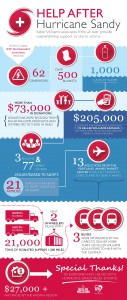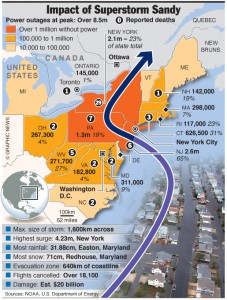 .Global warming contributed to Hurricane Sandy but did not cause the category three hurricane. Researchers are still unaware of how much of climate change influenced Sandy. A hurricane is a storm with a violent wind, in specific a tropical cyclone in the Caribbean. A tropical cyclone is a rapidly-rotating storm system characterized by a low-pressure center, strong winds, and a spiral arrangement of thunderstorms that produce heavy rain. To be considered a hurricane it has to sustain winds of at least 34 meters per second (66kn) or 74 miles per hour (119 km/h). A cyclone the size of a hurricane usually develops an eye which is an area of comparative calm (lowest atmospheric pressure) at the center of circulation. Tropical cyclones usually form over relatively warm bodies of water. They derive their energy from the dissolved water from the ocean surface, ultimately it condensates into clouds and rain when moist air rises and cools to saturation. Lastly the term cyclone refers to their cyclonic nature in which the wind blows counterclockwise in the Northern Hemisphere and clockwise in the Southern Hemisphere.
.Global warming contributed to Hurricane Sandy but did not cause the category three hurricane. Researchers are still unaware of how much of climate change influenced Sandy. A hurricane is a storm with a violent wind, in specific a tropical cyclone in the Caribbean. A tropical cyclone is a rapidly-rotating storm system characterized by a low-pressure center, strong winds, and a spiral arrangement of thunderstorms that produce heavy rain. To be considered a hurricane it has to sustain winds of at least 34 meters per second (66kn) or 74 miles per hour (119 km/h). A cyclone the size of a hurricane usually develops an eye which is an area of comparative calm (lowest atmospheric pressure) at the center of circulation. Tropical cyclones usually form over relatively warm bodies of water. They derive their energy from the dissolved water from the ocean surface, ultimately it condensates into clouds and rain when moist air rises and cools to saturation. Lastly the term cyclone refers to their cyclonic nature in which the wind blows counterclockwise in the Northern Hemisphere and clockwise in the Southern Hemisphere.
Hurricane Sandy was the deadliest and most destructive hurricane of the 2012 Atlantic hurricane season and was a category three. Sandy reached it’s peak in Cuba and became the largest Atlantic hurricane on record, with winds spanning 1,100 miles (1,800 km). Hurricane Sandy killed 148 people directly and 138 indirectly, and costing over $68 billion (USD) in damage. The interesting thing about Sandy is it fluctuated and didn’t stay a hurricane the whole time. She started off as a tropical storm then switched to a hurricane around Jamaica where it kept switching back  and forth until it weakened over Pennsylvania.
and forth until it weakened over Pennsylvania.
According to the National Center for Atmospheric Research “The answer to the oft question of whether an event is caused by climate change is that it is the wrong question. All weather events are affected by climate change because the environment in which they occur is warmer and moister than it used to be” (Kevin E. Trenberth). LiveScience said it was too early to make any judgments but that global warming contributed to, but did not directly cause the massive storm. One major factor contributing to Hurricane Sandy was the abnormally warm sea surface temperatures offshore the East Coast of the United States more than 5◦F about normal, to which global warming contributed 1◦F. As the temperature of the atmosphere surges, the capacity to hold water increases, leading to stronger storms and higher rainfall. A trough of low pressure dipped down from the Arctic feeding the hurricane, firming its intensity as it moved northward. A study in September in the journal Geophysical Research Letters, found that hurricanes and tropical cyclones ramp up quicker than they did 25 years ago, with 4% more moisture than in the 1970s. Climatologist Michael Mann from Pennsylvania State University, argues sea levels are 1 foot and 30 centimeters higher than it was a century ago, causing a more damaging storm surge. He also states that although climate change did not create Hurricane Sandy, storms become more intense as the planet warms.
Other scientists such as Mark CC at Scientopia argue that Sandy was directly caused by global warming stating “the warmer waters are by definition global warming: they’re one of the things we  measure when we’re measuring global temperature trends”. Hurricane Sandy took a sharp turn towards the north which is a very unusual weather event, called a negative North Atlantic Oscillation (-NAO). The east to west movement, which is the opposite of how weather systems normally move, helped maximize the storm surge. Also by the warming of the seas and the atmosphere, global warming is also expected to alter hurricane frequency and intensity. The “blocking” events over the years also are said to be related to global warming and the melting of the ice caps.
measure when we’re measuring global temperature trends”. Hurricane Sandy took a sharp turn towards the north which is a very unusual weather event, called a negative North Atlantic Oscillation (-NAO). The east to west movement, which is the opposite of how weather systems normally move, helped maximize the storm surge. Also by the warming of the seas and the atmosphere, global warming is also expected to alter hurricane frequency and intensity. The “blocking” events over the years also are said to be related to global warming and the melting of the ice caps.
I believe that Hurricane Sandy wasn’t a cause of global warming directly but indirectly. As explained above Sandy would have happened anyway it was just intensified by the results of global warming. I do agree that global warming can cause more storms in the future especially with the rise in water levels and moisture. Some ways we can all do our part in helping reduce global warming is: reduce waste, conserve water, plant trees, and reduce fossil fuel use.
References:
- http://www.climatecentral.org/news/how-global-warming-made-hurricane-sandy-worse-15190
- http://blogs.scientificamerican.com/observations/2012/10/30/did-climate-change-cause-hurricane-sandy/
- http://scientopia.org/blogs/goodmath/2012/11/08/did-global-warming-cause-hurricane-sandy/
- http://www.huffingtonpost.com/2012/11/06/hurricane-damage-climate-change_n_2081960.html
- http://www.livescience.com/24377-weather-climate-hurricane-sandy.html








